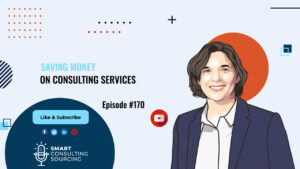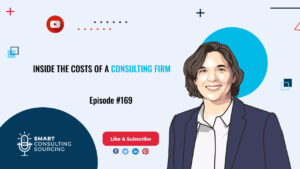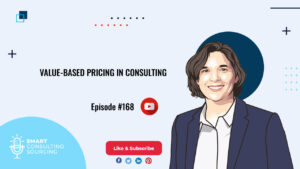Hello and welcome to the ninth episode of our podcast: Smart Consulting Sourcing, THE podcast about Consulting Procurement.
My name is Hélène, and I’ll be your host today.
Each week I’ll give you the keys to better use, manage and source consulting services.
In this ninth episode, I’ll explain how to negotiate a consulting agreement
Last week I explained how to select the right consultant. Now you have a proposal that you think answers to your needs: you can start negotiating.
Prepare before you negotiate a consulting agreement
First thing you need to do is, Prepare. But why prepare exactly? Well, let’s go back to the goal of this negotiation.
We want to find a satisfying agreement for both parties. right? And How do you buy a satisfying agreement exactly? Well, you need to have leverage and that means gathering as much information as possible on the service, the provider, and the market.
What information do you need exactly?
The three key parts in consulting is that you can negotiate on almost all the components of the proposal. That can be the scope, team composition, price, etc. So the first thing you need to do is decide, what is it exactly that you want to negotiate?
What are the parts that are on the table exactly?
You have to be clear on your “must-have” and your “nice-to-have”. You may be looking for a very niche expertise and in that case team competition is not negotiable or maybe you have a budget constrain. The cost is not negotiable and you have to go for a design to cost approach.
There’s another thing you need to find out is how much you’re willing to pay? and I always tell my clients to think value first. What impact that you expect from that project? Is it the impact on the bottom line? On the top line? On the company valuation
What value does that project have for you? And then you can define how much you are willing to pay. Now compare the price of the proposals and how much you’re willing to pay and that is the magnitude of the negotiation in terms of pricing.
How much latitude do you have in the negotiation?
There’s another thing that you need to figure out is how much latitude do you have in the negotiation? when you have organized a competition and you have other proposals or if you have alternatives if the deal falls short? Then you have some more latitude than if your hands are tied.
And Finally, you have to build a team to bring to the table. That team will depend on the size and the strategic importance of the project but the goal is to collectively understand the proposal, propose winning compromises, and negotiate efficiently.
Find the perfect deal
When you have all this figured out, you can go to the second step – the deal. When you are negotiating for a consulting project, you have to anticipate what the consultants will do, what is the best deal for them, and what are the alternatives will they will most probably propose?
And keep in mind that the best deal is a positive outcome for both parties, that’s the basis for a long-term relationship. You don’t want to be that client for which we always had a 20% premium because negotiations are always a pain.
Again, this is a difficult negotiation because you have multiple dimensions. In this context, you know the BATNA – Best Alternative To a Negotiated Agreement and ZOPA – Zone Of Possible Agreement are the concepts that can be really handy.
You have to play with different dimensions that you have defined as open to negotiation to draw scenarios and define what are the options that can be acceptable for your organization.
It’s also important to understand how the changes in scope or team staffing will impact the price so you can really understand the dynamics in that project. You need to identify the trade-offs you are willing to accept.
But if at the end of the process if the price is still too high, you can look at awesome saving opportunities. There are some, for instance, you have the travel expenses, you can always either cap the travel expenses or include them as an all-inclusive pricing so you can keep them under control.
You can also look at expert staffing, Do you really need all those experts? and Do you really need all the time that has been allocated for the project? One-Third saving opportunity is on the ramp-up/ramp-down staffing, it’s rare that you need 100% of the team from day one. So maybe if you kind of stretch their onboarding on a few days then you can save some money as well.
At some point you will be ready to close the deal.
Conclude the negotiation
It’s extremely important to draw the consulting agreement based on the content of the proposal and you need to make sure that the main parts are there, in particular the deliverables, the timeline, and the team composition.
Another thing that is extremely important is to debrief the other consultants, you know the ones that lost the project. And why is it so important? It’s because this is the only way for them to improve the way they sell. You know the best consultants are the ones that deliver the best quality work and are not always the best sellers and vice versa. So if you can give them some feedback on how well they did, maybe for the next client they’ll do a better job and they’ll earn more projects.
And likewise, you can ask for some feedback and how you manage the sourcing process so you can improve how well you did and how well your teams interact with the consultants.
That’s it for today. Next week I will explain why I think Consulting is a stand-alone category.
In the meantime, if you have any questions, or want to learn more about what we do at consulting quest, just send me an email at helene.laffitte@consultingquest.com
Bye and see you next week! Au revoir!
Negotiate a consulting agreement. Negotiate a consulting agreement. Negotiate a consulting agreement. Negotiate a consulting agreement. Negotiate a consulting agreement. Negotiate a consulting agreement. Negotiate a consulting agreement. Negotiate a consulting agreement. Negotiate a consulting agreement. Negotiate a consulting agreement. Negotiate a consulting agreement. Negotiate a consulting agreement. </>







